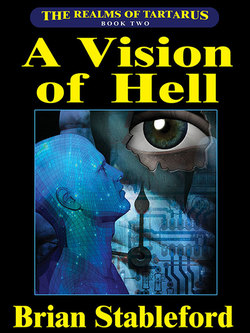Читать книгу A Vision of Hell - Brian Stableford - Страница 9
На сайте Литреса книга снята с продажи.
ОглавлениеCHAPTER 5
Heres believed that he had saved the world. Two worlds, in fact. That was—had to be—the perfect solution. The ideal game is the one which everybody wins. Heres, it will be remembered, was a brilliant Hoh player. The idea of a second Plan, to accomplish what even the initial Planners had assumed to be beyond their talents, was, in Heres’ eyes, the masterstroke.
Eleven thousand years of history demanded of the people of Euchronia a commitment—a commitment that was clear, altruistic, and ambitious. The declaration of the Millennium had left not only the Movement but the entire civilization stranded on a spiritual desert island. The age of psychosis could never return, and the i-minus effect seemed to assure social adjustment, and therefore social sanity, but Euchronian culture was nevertheless dangerously full of alarm signals. Rypeck had read those signals, and Rypeck had been on the borders of fear and anxiety for years. Heres had read the signals, too, but Heres had a cool head. Heres had faith. And he had found the answer—the political and intellectual coup de grâce. Barring all accidents, not only was his political future as Hegemon secured, but also the future of the Movement and the human race.
Barring all accidents.
What accidents? For one thing, of course, he had jumped the gun. There was, as yet, no report from Harkanter and his party regarding conditions in the Underworld. Politically, the right moment had come before he had all the facts at his command, and thus there was a risk—of some kind. But Heres knew what Rypeck had found out about the Underworld—that it lived, that it was lighted, and that the Overworld was geared to resist the invasion of its life-forms. He also knew what Abram Ravelvent had discovered—that materials were constantly exported from the world above to the world below—materials like steel implements and books, which spoke conclusively of human life and some degree of human culture. Heres knew little enough about the Underworld, but it was enough to be sure. It mattered little how severe the conditions in the Underworld might be, or how savage the people. The magnitude of the task was, thanks to the Planners’ precedent, quite irrelevant. Heres was quite confident that any accidents of circumstance could be overcome. He still had faith in himself. Rather more than that, in fact—he had ultimate faith in the essential nature of things, in the fact that the situation (all situations) not only provided an answer by which everybody could win, but were so structured as to demand such an answer. This faith did not arise from the fact that he was a devoted Hoh player—the reverse was actually the case. That was the way Heres conceived of the universe working. It was his understanding of existence. Hoh was only a model—a simulation—of reality.
Heres also knew that he had sidestepped the thorny questions which the Magner affair had initially asked. Those questions, framed by Enzo Ulicon, had seriously disturbed Rypeck (who was, of course, ripe for disturbance). In Heres’ scheme, there were no answers to those questions. Instead, Heres was prepared to hope that he had rendered the questions irrelevant and immaterial.
Magner had had bad dreams. Terrible dreams. That meant that either the i-minus effect was not effective, in his case, or there was another input into his dreams—presumably telepathic. Ulicon had held the latter alternative to be the more likely. Heres had said nothing, but he had always preferred the former. He had already known—as everyone with eyes to see must have known—that the i-minus effect was not operating as per prescription in the Millennial society. No one knew how, or why, it was going wrong, but it was. Heres was inclined to attribute the deficit not to the i-minus agent but to the social psychology of the people. I-minus favored social adaptation, the establishment of social values as absolutes. If i-minus was failing, then it was for lack of social values rather than lack of adaptive capacity, so Heres thought. Given a plan—an ideal, a great social goal—then i-minus would work again. So Heres believed. He had seen Magner as the tip of an iceberg rather than a unique case of something new.
Heres was prepared to assume that the second Euchronian Plan would solve everything. His understanding of reality encouraged him to make this assumption. He was aware, however, that it remained an assumption. He was not blind to the possibility that some unforeseen, incalculable factor might yet be thrown into the equation. He was mentally ready for such a thing to happen. It did.
